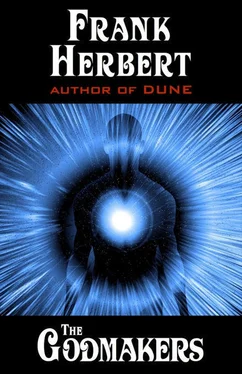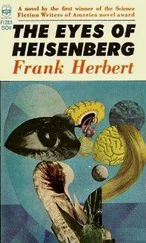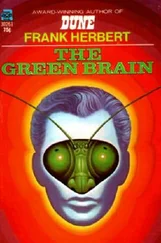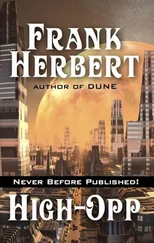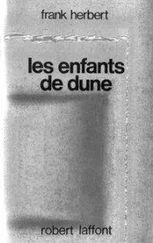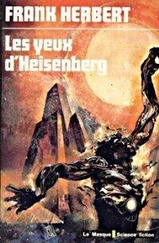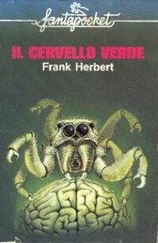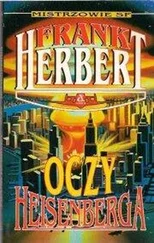“I’m glad you found something to keep you busy.”
“Do not sneer,” Bakrish said. “We have no wish to destroy you. We want you to use the devices which were given to you. That is why you got them and were taught to use them.”
Orne took two deep breaths. Psi training took over without conscious volition. He concentrated on the inner focus for calmness and it came like the wash of cool water. He became icy, observant, calm, sensitive to any psi force. And at the same time, thoughts blazed in his mind. This was not the pattern of events he had expected. Did they have him boxed?
“Have you any questions?” Bakrish asked.
Orne cleared his throat. “Yes. Will you help me to see the Abbod Halmyrach. I must find out why Amel is trying to destroy the…”
“All in its own time,” Bakrish said.
“Where do I find the Abbod?”
“When the time comes, it will be arranged for you to see him. He is nearby and awaits these events with great curiosity, I assure you.”
“What events?”
“Your ordeal, of course.”
“Of course. When you try to destroy me.”
Bakrish appeared puzzled. “Believe me, my young friend, we have no desire to cause your destruction. We have merely taken necessary precautions. These are dangerous matters which engage our attentions.”
“You said you could destroy me.”
“Only under the most dire necessity. You must understand the two basic facts here now: You want to find out about us and we want to find out about you. The best way for both of us to accomplish this is for you to submit to your ordeal. You really have no choice.”
“So you tell me!”
“I assure you.”
“So I’m supposed to let you lead me along like a grifka going to the slaughterhouse. Either that or you destroy me.”
“Bloody thoughts really are not suitable,” Bakrish said. “Look upon this as I do: It is an interesting test.”
“But just one of us is in danger.”
“I would hardly say that," Bakrish said.
Orne felt anger surge through him. For this, he had suffered the postponement of his wedding, the ministrations of medics who very likely had been directed by a traitor to the I-A, had undergone the grinding psi course. For this!
“I’m going to find out what makes you tick,” Orne grated, glaring at Bakrish, “When I do, I’m going to smash you.”
Bakrish paled. His yellow skin appeared sickly. He swallowed, shook his head. “You must be exposed to the mysteries,” he murmured. “It is the only way we know.”
Orne felt embarrassment at his burst of bravado, thought: Why is this joker afraid? He’s in the driver’s seat here, but my threat frightened him. Why?
“Do you submit to the ordeal?” Bakrish ventured.
Orne pushed himself back in the chair. “You said I have no choice.”
“Truly, you have not.”
“Then I submit. But the price is an interview with the Abbod!”
“Of course… if you survive.”
We come from the All-One and return to the All-One. How can we keep anything from the Source that was and the End that is?
—Sayings of the ABBODS
“He has arrived, Reverend Abbod,” the priest said. “Bakrish is with him now.”
The Abbod Halmyrach stood at a scribe’s easel, his bare feet on an orange rug that matched his long robe. The room, its windows shuttered against Amel’s glaring sunlight, appeared shadowy and archaic. Dim light came from ancient glowglobes which hovered in the upper corners of the room. There were wood walls and a fireplace with orange coals in it behind the Abbod. His narrow face with its long nose and thin-lipped mouth appeared calm, but the Abbod was acutely aware of his room, of the oily shadows on the wood walls, the scratching of the priest’s sandals on the floor beyond the rug, the faint stirrings of the fire dying in the fireplace.
This priest reporting now, Macrithy, was one of the Abbod’s most trusted observers, but the man’s appearance—long black hair with deep sideburns framing a smoothly rounded face, the dark stovepipe suit and reversed white collar—bothered the Abbod. Macrithy looked too much like an historical illustration from accounts of the Second Inquisition. One did not, however, question religious accouterments which came under the freedoms of the Ecumenical Truce.
“I sensed his arrival,” the Abbod said. He turned back to the easel, writing with pen on paper because it pleased him to keep the ancient ways alive. “There does not seem to be any doubt he is the one.”
Macrithy said: “He has made the three transcendent steps, but there is no certainty he will survive his ordeal and discover you, who summoned him.”
“To discover has many meanings,” the Abbod said. “Have you read my brother’s report?”
“I have read it, Reverend Abbod.”
The Abbod looked up from his writing. “I saw the little green box, you know. I saw it in a vision in the instant before the Shriggar appeared to us. I also saw my brother and felt the transcendent influence on his emotions brought about by that moment. It fascinates me the way the prediction follows so precisely upon the Shriggar’s words. It tracks, as they say.” He returned to his writing.
“Reverend Abbod,” Macrithy said, “The game of war, the city of glass and the time of politics are past. I have studied your account of the god making. It is now time for us to fear the consequences of our daring.”
“And I am afraid,” the Abbod said, not looking up.
“We all are,” Macrithy said.
“But think of it,” the Abbod said, putting a punctuation mark on his writing with a flourishing gesture. “This is our first human! What have we touched in the past—a mountain on Talies, the Speaking Stone of Krinth, the Mouse God on Old Earth, animate and inanimate elements of that ilk. Now, we have our first human god.”
“There’ve been others,” Macrithy said.
“But not of our making!”
“We may regret it,” Macrithy muttered.
“Oh, I already do,” the Abbod said. “But there’s no changing that now, is there?”
The day is short and the work is great, and the workers are lazy, but the reward is large and our Master urges us to make haste.
—Writings of the ABBOD HALMYRACH
“This is called ‘The cell of meditation-on-faith,’” Bakrish said, gesturing toward the room whose door he had opened for Orne.
“You are required to stretch out on the floor in there flat on your back. Do not sit or stand until I give permission. It is very dangerous.”
“Why?” Orne leaned in, studied the room.
It was a high and narrow place. Walls, floor and ceiling appeared to be white stone veined by thin brown lines like insect tracks. Pale-white light, sourceless and flat as skimmed milk, filled the room. A smell of damp stone and fungus permeated the space.
“This is a psi machine of great potency,” Bakrish said. “Flat on your back, you are relatively safe. Accept my word for it; I have seen the results of disbelief.” He shuddered.
Orne cleared his throat. He felt cold. The vacant place in his stomach was a distended bag warning him of terrible peril. He said: “What if I refuse to go through with this?”
“Please,” Bakrish said. “I am here to help you. It is more dangerous to turn back than it is to go ahead. Far more dangerous.”
Orne sensed sincerity in the words, turned and met a pleading stare in the priest’s dark eyes.
“Please,” Bakrish said.
Orne took a deep breath, stepped into the cell. He felt a slight easing of the danger signal but it remained strong and insistent.
“Flat on your back,” Bakrish said.
Читать дальше
